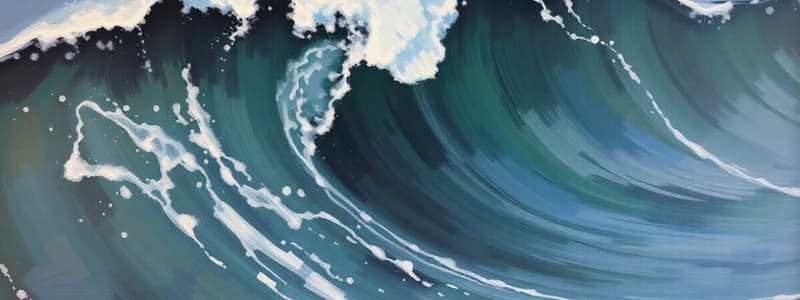Podcast
Questions and Answers
How is the speed of a wave calculated?
How is the speed of a wave calculated?
- By multiplying the wavelength by the frequency (correct)
- By adding the wavelength to the frequency
- By dividing the frequency by the wavelength
- By subtracting the wavelength from the frequency
What does frequency measure in terms of waves?
What does frequency measure in terms of waves?
- The speed at which the wave travels
- The distance between two wave crests
- The number of waves passing a point per second (correct)
- The height of the wave crest
What is the relationship between amplitude and energy transported by a wave?
What is the relationship between amplitude and energy transported by a wave?
- Amplitude can vary independently of energy
- Higher amplitude means less energy is carried
- Higher amplitude correlates with more energy carried (correct)
- Amplitude does not affect energy transport
How is frequency measured in terms of units?
How is frequency measured in terms of units?
Which of the following is true about the relationship between frequency and amplitude?
Which of the following is true about the relationship between frequency and amplitude?
What describes the frequency of a wave?
What describes the frequency of a wave?
If a wave has a period of 2.8 seconds, what is its frequency?
If a wave has a period of 2.8 seconds, what is its frequency?
What happens to the wavelength of a wave as its frequency increases?
What happens to the wavelength of a wave as its frequency increases?
What does an increase in amplitude indicate about a sound wave?
What does an increase in amplitude indicate about a sound wave?
Which color of visible light corresponds with the highest frequency?
Which color of visible light corresponds with the highest frequency?
Which of the following is NOT a characteristic used to describe waves?
Which of the following is NOT a characteristic used to describe waves?
How are sound waves different from light waves in terms of frequency?
How are sound waves different from light waves in terms of frequency?
In terms of wave propagation, what is an electromagnetic wave commonly characterized by?
In terms of wave propagation, what is an electromagnetic wave commonly characterized by?
What effect does reducing the frequency of a wave have on the time taken to complete one cycle?
What effect does reducing the frequency of a wave have on the time taken to complete one cycle?
If a wave has a high frequency, which of the following statements is true?
If a wave has a high frequency, which of the following statements is true?
Flashcards
Wave Frequency
Wave Frequency
The number of wave cycles that pass a point per unit of time (e.g., per second).
High Frequency Wave
High Frequency Wave
A wave that completes many cycles per second.
Low Frequency Wave
Low Frequency Wave
A wave that completes fewer cycles per second.
Frequency in Light
Frequency in Light
Signup and view all the flashcards
Frequency in Sound
Frequency in Sound
Signup and view all the flashcards
Wavelength
Wavelength
Signup and view all the flashcards
Frequency-Wavelength Relationship
Frequency-Wavelength Relationship
Signup and view all the flashcards
Wave Period
Wave Period
Signup and view all the flashcards
Frequency Formula
Frequency Formula
Signup and view all the flashcards
Wave Amplitude
Wave Amplitude
Signup and view all the flashcards
Amplitude and Energy
Amplitude and Energy
Signup and view all the flashcards
Amplitude vs. Frequency
Amplitude vs. Frequency
Signup and view all the flashcards
Hertz (Hz)
Hertz (Hz)
Signup and view all the flashcards
Study Notes
Wave Characteristics
- Waves are propagating, oscillating deformations of quanta or mediums.
- Examples include water waves (transverse), sound waves (compression), and electromagnetic waves (transverse, oscillating electric and magnetic fields).
Wave Frequency
- Frequency describes the number of wave cycles per unit time (e.g., per second).
- Higher frequency = more cycles/second, shorter wavelengths.
- Lower frequency = fewer cycles/second, longer wavelengths.
- Frequency in light relates to color (violet highest).
- Frequency in sound relates to pitch.
Frequency Formula
- Frequency (f) = 1 / Period (T)
- Measured in Hertz (Hz), where 1 Hz = 1 cycle/second.
Wave Period
- Period (T) is the time for one complete wave cycle.
- Period (T) = 1 / Frequency (f)
Wave Amplitude
- Amplitude (A) measures the energy carried by a wave.
- For transverse waves, amplitude is the distance from the rest position to the crest or trough.
- For longitudinal waves, amplitude is expressed as pressure (e.g., pascals, decibels).
- Amplitude for electromagnetic waves is expressed as volts per meter or as brightness.
Amplitude vs. Frequency
- Amplitude and frequency are independent.
- Waves with the same frequency can have different amplitudes (e.g., same color light but different brightness).
- Likewise, waves with the same amplitude can have different frequencies (e.g., different pitches at same sound level).
Studying That Suits You
Use AI to generate personalized quizzes and flashcards to suit your learning preferences.




